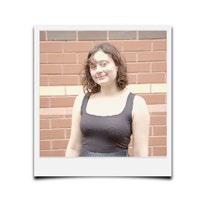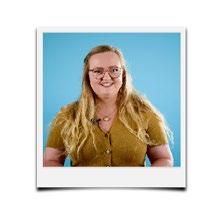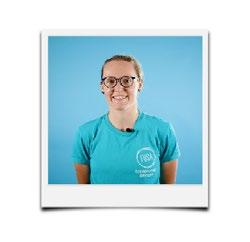
11 minute read
A Glimpse Into Your Student Council
The Student Council is the elected representative body for Flinders students. These representatives each hold a portfolio and are elected by the general student body each year. They receive financial honorariums in return for their work, ranging from $2,000-$28,000 p.a. The current Student Council was elected on the 7th of October 2021 and assumed office on the 30th of November 2021.
Empire Times thanks the council members who worked with us through the submission and editing phase to help us create a culture of transparency. Unedited and extended responses will be available online, follow @empire.times on Instagram, and like us on Facebook for updates!
Welfare Officer Darlyn Tan-Sik She/They welfare.officer@flinders.edu.au
What would you like the Flinders community to know about you? I am a Psychology Honours student and the President of the Queer Collective. I love animals, music, a good drama show and Animal Crossing (with 600+ hours to show for it!)
What drew you to your position? I am a person who oversaw and experienced injustices and discrimination within systems and society, so I wanted to know how I could help people. As I learned more about how I could make positive change, I actively pursued opportunities to do so. This position will allow me to work with students and staff to implement policies, campaigns, and support systems for students.
What would you like to achieve in this role? I want to achieve better accessibility for students to learn and live in our current society while studying at Flinders University. I want to also educate, raise awareness and advocate for policy change on supporting students with neurodivergence and mental illness.
What do these goals look like? What benefit will they bring to students? Closed captioning for academic content, financial grants, food packages and access to mental health support services. These resources and services will allow for students to have better accessibility and knowledge about essentials and how the FUSA and the university can support students
What are some of the steps involved? What barriers do you foresee? Contacting and meeting with Student Council, FUSA and academic staff, and mental health services to collaborate and communicate the logistics of the projects mentioned above. Communicating with students to ensure these projects benefit them, and how to improve accessibility. With new regulations and structures made due to ensure community safety from Covid-19, there is also a decrease in accessibility. Another barrier that can be foreseen is my own personal experience as an individual and the lack of experience in specific areas. The Welfare Officer position is for the great diversity of students and their lives during their time here at Flinders University and I may not have the knowledge and personal experience for specific issues

Women’s Officer Alivia Vickers She/Her
Womens.officer@flinders.edu.au
What would you like the Flinders community to know about you? I am studying a combined degree of International Relations & Political Science and a Bachelor of Languages (Japanese and Mandarin). I immigrated to Australia at 14 and grew up in a multicultural household. After being effectively adopted by my beloved aunt Yayoi, I began following a Japanese denomination of Buddhism called Shinnyo-en and love to learn about religions What drew you to your position? The influence of my stepmother who came into my life after a lot of deep-rooted ideologies about what it meant to be a woman and non-man in a world made to suit the lifestyles of men. Being a survivor of domestic violence, sexual assault and poverty, I wanted to make change and provide opportunities for others. What would you like to achieve in this role? I would love to ensure that there is cultural diversity and representation amongst clubs, collectives, and the university that concern and include women and non-men. I would also like to work towards a community that protects the safety of student on campus. What do these goals look like? What benefit will they bring to students? To me these goals look like proper representation of people of colour and different cultural and spiritual backgrounds, as well as inclusive of members of the queer community. In regard to safety on campus, this may look like support groups, accessibility plans, self-defence class and information on services. This would allow for greater diversity in representation and safety What are some of the steps involved? What barriers do you foresee? In the professional sense, COVID-19. On a personal level, dealing with some of the more sensitive topics may be difficult, but I plan on overcoming these barriers by working closely with effected communities and the rest of Student Council. Is there value in affiliating the Women’s Collective to FUSA? Will you assist in this affiliation? What kind of timeline can we expect for affiliation? I believe there is great value in affiliating the Women’s Collective to FUSA. Collectives create the necessary means of close communication to ensure multiple perspectives are considered. I would love to work on the affiliation of the Women’s Collective. There is currently no timeline planned. Do you feel like your experience differs from others on the student council as you were elected for this position unopposed? I do feel that my experience differs from my colleagues on the Student Council in being the only member elected unopposed. On one hand, I was further motivated in being proactive. On the other, I was grateful that the role of Women’s Officer was filled and that a position with the ability to tip the scales of inequality and discrimination at Flinders was not left vacant. I was shocked to experience the ease that a role with vast amounts of responsibility could go by uncontested
Queer Officer Shanii Sparrow He/Him

Queer.officer@flinders.edu.au
What would you like the Flinders community to know about you? I have a rescue greyhound named Lao. I really like Kimchi, my favourite colour is orange, and my hobbies are skateboarding and photography. I’m non-binary and I own about 100 plants. What drew you to your position? I was attracted to the position as I had a strong passion for activism and a background in refugee, First Nations, and human rights campaigns. One of the first major events that showed me how important LGBTQIA+ advocacy is was the marriage equality debate. This showed me how much more work needs to be done to ensure we’re providing queer people with access to safe living, learning and community environments. What would you like to achieve in this role? In 2022 I hope to finalise and launch my free chest binder pilot program, improve access to LGBTQIA+ health services, and continue helping assist people in decolonising queer spaces through art initiatives that provide visibility, supporting People of Colour, and First Nations people.
What do these goals look like? What benefit will they bring to students? Office Bearers are allocated a budget of $2,000 and then need to try and make this stretch across all students and 12 months worth of support, projects and autonomous space upgrades. This means there’s lots of administrative work. behind the scenes: countless hours of emailing, budgeting, meetings, spreadsheets, negotiations, and vision boards. I am currently in the process of connecting with a range of stakeholders. Visibility, diversity, and access to helpful and supportive healthcare are things that support and benefit all students. Often, the main thing I hear from the student body is “I’m not queer enough”, “I feel alone, nobody is like me”, “which doctors are safe”, “where do I go”. The queer community is so beautiful and diverse, but broken connections make us feel like we’re alone or not the “right” kind of queer. I believe by improving visibility, diversity and access to community and healthcare we can help close these gaps and ultimately improve students’ wellbeing.
Burnout is a massive barrier that almost all Student Council face. Most of us are studying full time, with additional responsibilities such as working part time, family, or health commitments in addition to doing Student Council. In truth the majority of us end up dedicating full time hours to our jobs at FUSA. As Queer Officer, I’m expected to complete three hours of work per week, however during my time planning Pride Fest 2021, for one of the two planning months I ended up clocking in around 150 hours. For context, our yearly commitment to FUSA is 156 hours. So in an attempt to complete one project and support students to the best of my ability I did almost a year’s worth of work in about a month. Which is an unsustainable workload, but one I felt I had to take on to meet deadlines whilst also managing the expectations and limitations of the role

Mature Age Students Officer Jessica Williams She/Her
Matureage.officer@flinders.edu.au
What would you like the Flinders community to know about you? I am a mature aged student studying Forensic Biology and a mum with a huge family. I love exploring places around Adelaide. After school, which I didn’t finish due to needing to work to live, I spent 12 years learning, growing, and eventually having a family.
What drew you to your position? I enjoyed socialising with the diverse cohort of students around campus and wanted to be further involved in supporting students. I started as a topic rep and as a student ambassador. I took on the challenge of running for Mature Age Officer because I was questioning if mature aged students were receiving the same support as school leavers. Many of the students I attended class with were fresh out of high school, tech savvy and fresh with their academic understanding. A lot of the work was put into compensating for this difference – what if other mature aged students were struggling?
What would you like to achieve in this role? I would love to facilitate opportunities for more mature aged students to share their experiences and feedback; share the importance of support networks; and depict the wide range of daily lives of Flinders students. Higher education should not be a one size fits all.
What do these goals look like? What benefit will they bring to students? This looks like on campus events to facilitate conversation; build up the mature aged students collective; implementing a playgroup for caregivers. This will provide the perspectives of mature aged students experiences to help build an understanding of the struggles that come with being a mature aged student. Hopefully, this will inspire support for change.
What are some of the steps involved? What barriers do you foresee? To state the obvious, COVID-19 has continued to make things difficult. Hopefully, we can navigate these challenges and find better ways to connect and engage. Managing my studies alongside my goals for this role will be challenging. At home, my large family will be both a strength and a difficulty in keeping my life balanced.
How does a mature age student’s experience differ from a school-leaver? This depends on the student, but often mature aged students are entering Uni while having work, caring duties, and health difficulties that some school-leavers may not yet have. This leaves little time for students to upskill, take time for selfcare, and navigate unexpected circumstances. For example, when my children get sick and I need to care for them – this leaves missed classes to catch up on.
Disabilities Officer Anu Francis She/Her
Disabilities.officer@flinders.edu.au

What would you like the Flinders community to know about you? I study Education/Exercise Science & Physiology and am an elite para-athlete, seeking qualification for the 2024 Paralympics in triathlon. In 2017 I graduated Bachelor of Science (Veterinary Bioscience) at UofA but transferred to Flinders in 2018 due to my disabilities (Ehlers Danlos Syndrome and Dystonia) jeopardising my eligibility for registration as a Doctor of Veterinary Medicine. This discrimination founded my passion for disability advocacy, which has led me into this role. What drew you to your position? During my first semester at Flinders, I ran into significant accessibility issues and was disappointed by the lack of support available. Staff empathised with my challenges and reported that many of my concerns had been raised by countless students before me but stated that the issues were simply out of their control. Not one to take ‘no’ for an answer, when I saw the vacancy for FUSA Disabilities officer in mid-2018, I jumped at the opportunity.
What would you like to achieve in this role? Completion of several major projects from my previous terms, including the final set up and opening of the permanent Disabilities Space in the library and utilisation of our full fleet of Basketball Wheelchairs. I also aim to increase the profile of the Flinders University Disabilities Collective.
What are some of the steps involved? What barriers do you foresee? The greatest barrier I have faced and will continue to face in this role is that whilst students move quickly, the university moves slowly. This is why the majority of my projects have been multi-year and is precisely why I have remained in the role for multiple terms.
What are some areas you’ve identified that really need improvement from the university regarding disability support and inclusivity?
When I came into this role, the list of areas for improvement was overwhelming! Whilst we have made significant progress, areas that still need significant improvement include wayfinding and physical accessibility of all Flinders campuses (with the Sturt campus being particularly problematic) and students with disabilities readily receiving the reasonable and necessary adjustments that they need to access education on the same basis as their peers without disability.









